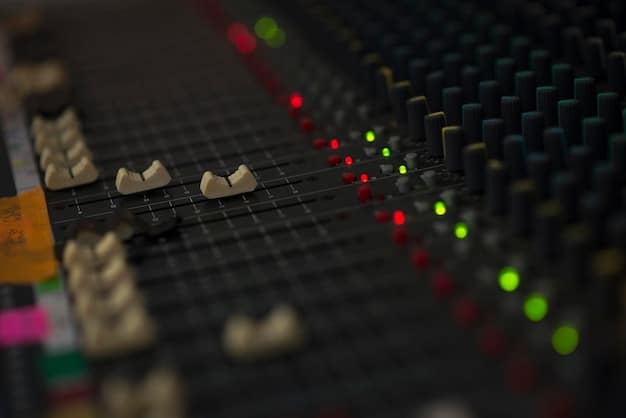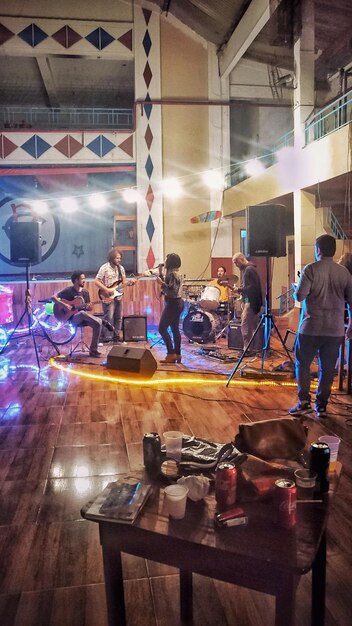US Rap’s Unsigned Heroes: Get Noticed and Signed

US Rap’s Unsigned Heroes face the challenge of getting their music heard, but with the right strategies for pitching to record labels, including crafting a compelling press kit, building an online presence, and networking effectively, they can increase their chances of getting noticed and signed.
For **US Rap’s Unsigned Heroes**, the journey to getting signed can seem daunting. But with the right approach, it’s absolutely achievable. This guide will provide actionable strategies to help you pitch your music to record labels and get the attention you deserve.
Crafting Your Sound: Defining Your Unique Brand
Before even thinking about pitching your music, it’s crucial to understand your brand. Who are you as an artist? What makes your sound unique? Defining your brand is the foundation upon which your career will be built.
Take time to explore your artistic identity, experiment with different styles, and hone your skills. The more authentic and polished your sound, the more likely you are to stand out to record labels.
Finding Your Niche within US Rap
The US rap scene is incredibly diverse. Identifying your niche allows you to target specific audiences and record labels. This targeted approach is key to increasing your visibility.
Developing a Consistent Artistic Vision
Consistency is crucial. Your music, visuals, and online presence should all align with your artistic vision. This creates a cohesive brand that is easily recognizable and memorable.
- Experiment with different flows and beats: Don’t be afraid to push boundaries.
- Find your voice and lyrical style: Authenticity resonates with listeners.
- Collaborate with other artists: Expand your network and reach new audiences.
Ultimately, crafting your sound is about more than just making music; it’s about defining who you are as an artist and presenting that identity to the world. It sets the stage for attracting the right kind of attention from record labels.

Building a Strong Online Presence: Your Digital Footprint
In today’s digital age, a strong online presence is non-negotiable. Record labels will scrutinize your social media, streaming platforms, and website. Building a compelling digital footprint is paramount.
Think of your online presence as your resume. It’s what record labels will use to assess your potential. Ensure it’s professional, engaging, and reflective of your brand.
Optimizing Your Social Media Profiles
Your social media profiles are your storefront. Ensure they are visually appealing, consistent with your brand, and easy to navigate. Use high-quality images and videos that showcase your music and personality.
Creating Engaging Content for Your Audience
Engage your audience with consistent and compelling content. This includes music, behind-the-scenes footage, live performances, and personal stories. The more you connect with your fans, the more loyal they will become.
- Post regularly and consistently: Maintain a consistent posting schedule.
- Use relevant hashtags: Increase your visibility and reach new audiences.
- Engage with your followers: Respond to comments and messages.
A strong online presence not only helps you attract the attention of record labels but also allows you to build a dedicated fanbase. This fanbase becomes a powerful asset that can significantly increase your chances of getting signed.
Creating a Compelling Press Kit: Your First Impression
A press kit, also known as an EPK (Electronic Press Kit), is your professional introduction to record labels and media outlets. It’s a concise and visually appealing package that showcases your music, brand, and accomplishments.
Your press kit is often the first impression you make, so ensure it’s polished, professional, and effectively communicates your unique value proposition. It should tell a compelling story that captivates the reader.
Essential Elements of a Press Kit
A well-crafted press kit should include high-quality photos, a bio, press clippings, your best tracks, and contact information. Each element should be carefully curated to present you in the best possible light.
Highlighting Your Unique Selling Proposition
What makes you different? Highlight your unique selling proposition in your bio and throughout the press kit. Focus on what sets you apart from other artists and why a record label should invest in you.
- Professional Photos: High-resolution, visually appealing images.
- Compelling Bio: A concise and engaging story of your journey.
- High-Quality Tracks: Your best and most representative music.
A compelling press kit is an invaluable tool for US Rap’s Unsigned Heroes. It provides record labels with all the information they need to quickly assess your potential and decide whether to take the next step.
Networking Effectively: Building Industry Connections
Networking is a crucial element in the music industry. Attending industry events, connecting with other artists, and building relationships with industry professionals can open doors that would otherwise remain closed.
Networking isn’t just about collecting business cards; it’s about building genuine relationships. The more people you know and trust in the industry, the greater your chances of finding the right connection.
Attending Industry Events and Conferences
Industry events and conferences provide opportunities to meet record label executives, managers, A&R reps, and other influential figures. Be prepared, be professional, and be ready to showcase your talent.
Leveraging Social Media for Networking
Social media can be a powerful networking tool. Connect with industry professionals, engage in conversations, and build relationships online. Just be sure to maintain a professional and respectful demeanor.

Building Relationships with Fellow Artists
Collaborating with other artists can expand your network and reach new audiences. It’s also a great way to learn from each other and grow as artists.
- Attend open mics and showcases: Get your music heard and meet other artists.
- Join online music communities: Connect with like-minded individuals.
- Offer genuine support to others: Build reciprocal relationships.
Effective networking is an ongoing process. Cultivate your relationships, stay in touch with your contacts, and always be on the lookout for new opportunities. Every connection you make could be the one that changes your career.
The Art of the Pitch: Making Your Voice Heard
The pitch is your opportunity to directly present your music to record labels. It’s a crucial step where you need to be prepared, confident, and persuasive.
Crafting the perfect pitch involves understanding what each label is looking for, tailoring your presentation to their specific needs, and delivering a compelling and memorable message.
Researching Record Labels and A&R Reps
Before pitching, carefully research the record labels and A&R reps you’re targeting. Understand their musical preferences, artist roster, and overall brand. This knowledge will help you tailor your pitch to their specific needs.
Crafting a Concise and Compelling Pitch
Your pitch should be concise, compelling, and tailored to the specific record label. Clearly articulate your unique selling proposition, highlight your accomplishments, and explain why you’re the right fit for their roster.
Following Up Without Being Pushy
Following up after your initial pitch is essential, but it’s important to strike a balance between persistence and pushiness. Be respectful of their time and understanding of their potential workload.
- Keep your email short and to the point: Respect their time.
- Personalize your message: Show that you’ve done your research.
- Offer something of value: Provide exclusive content or early access to your music.
Mastering the art of the pitch is critical for **US Rap’s Unsigned Heroes**. It requires careful preparation, strategic targeting, and a confident and persuasive delivery. With the right approach, you can significantly increase your chances of getting a meeting and ultimately, getting signed.
Navigating the Legal Landscape: Protecting Your Music
Protecting your music is a critical aspect of being a professional artist. Understanding copyright laws, registering your music, and seeking legal advice when necessary are essential steps to safeguard your creative work.
Navigating the legal landscape can be complex, but it’s important to take proactive steps to protect your rights. This ensures that you retain control over your music and receive the compensation you deserve.
Understanding Copyright Laws and Protecting Your Music
Copyright law gives you exclusive rights to your music, including the right to reproduce, distribute, and perform your work. Understanding these rights and how to protect them is crucial.
Registering Your Music with Copyright Offices
Registering your music with copyright offices provides legal protection and serves as a public record of your ownership. This makes it easier to enforce your rights in case of infringement.
- Research copyright laws in your region: Understand your rights and responsibilities.
- Register your songs with performance rights organizations (PROs): Collect royalties for public performances.
- Consult with an entertainment lawyer: Get professional legal advice.
Protecting your music is a fundamental responsibility for **US Rap’s Unsigned Heroes**. It ensures that your creative work is safeguarded, and that you receive the recognition and compensation you deserve.
| Key Point | Brief Description |
|---|---|
| 🎵 Define Your Brand | Craft a unique sound to stand out. |
| 🌐 Build Online Presence | Engage fans with consistent content. |
| 💼 Compelling Press Kit | Showcase your best work professionally. |
| 🤝 Network Effectively | Connect with industry professionals. |
FAQ
▼
An EPK, or Electronic Press Kit, is a digital resume for musicians. It showcases your music, bio, photos, and press clippings, acting as a first impression for labels and media outlets.
▼
Social media is vital. It’s where you connect with fans and show labels your reach. Keep profiles updated, engage followers, and maintain a consistent brand image.
▼
Attend industry events, research labels, and use LinkedIn. Engage genuinely, offer value, and respect their time. Don’t be afraid to reach out, but personalize your approach.
▼
A concise, compelling summary of your USP, track highlights, and your goals. Customize for each label, show you understand their brand, and highlight your potential value.
▼
Crucial. Copyright your music, register with PROs, and consult a legal professional. Protecting your work secures your rights and ensures you get credit and compensation.
Conclusion
For **US Rap’s Unsigned Heroes**, the journey to getting signed may be challenging, but it is attainable. By defining your brand, building a strong online presence, creating a compelling press kit, networking effectively, mastering the art of the pitch, and protecting your music, you significantly increase your chances of getting noticed and signed by a record label. Embrace the grind, stay true to your art, and never stop pushing your boundaries





